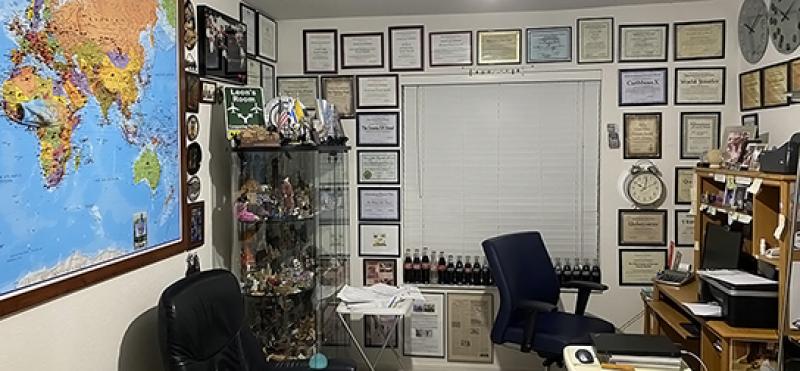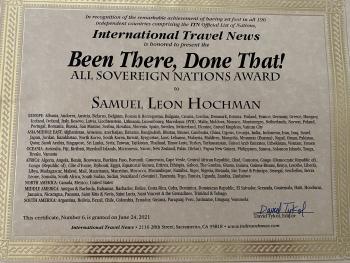Which countries' digital COVID vaccine certificates does the EU accept? Within Canada, vaccinated passengers only.
This item appears on page 4 of the December 2021 issue.
Dear Globetrotter:
Welcome to the 549th issue of your monthly worldwide travel magazine, the original travelers’ forum.
•
I’ve been meaning to share with you the achievement of one of your fellow ITN subscribers, (Samuel) Leon Hochman of Fort Lauderdale, Florida. He proudly informed us he had earned his ITN “Been There, Done That! All Sovereign Nations Award,” then sent us a photo of all of his ITN Travel Awards on display.
I asked Leon to write a few words to go with the photo, and here’s what he sent: “Nobody wakes up one day and decides to visit all the countries in the world. There is a process.
“I started by visiting some regions of my home country, Colombia, then some of the nearer countries. In 1981, I was living in Panama and for work reasons was sent to most of the Caribbean islands. I feel that’s when the travel mosquito bit me. I only thought about traveling and seeing countries where I had not been before.
“In 1994 I found a book called ‘Wonders of the World, 100 Great Man-made Treasures of Civilization.’ In October 2017, upon visiting the Pyramids of Meroë in Sudan, I completed seeing all 100 sites listed in the book.
“At some point, I noticed that I had traveled to most of the world’s countries, with not too many left, so I decided to visit all of them. On May 28, 2021, after 40 years of traveling and upon setting foot in Pakistan, I achieved my dream of seeing all 196 independent sovereign nations listed by International Travel News.”
“It has been a long way, with many flight hours, many waiting times at airports and full days without sleeping, but it all has been worth it. The rewards have been very gratifying.”
See what ITN Travel Awards you qualify for at intltravelnews.com/awards.
Now let’s get to some of the news affecting travelers.
•
Since the introduction of COVID-19 vaccines, countries in the European Union (EU) or the Schengen Area have been providing digital certificates — proof of vaccination — to anyone vaccinated there, even foreigners. These digital certificates can be saved on smartphones, facilitating entry to locations that require proof of vaccination and limiting the ability of people to steal or counterfeit vaccine records. Incidentally, digital certificates given by the United Kingdom, no longer in the EU, are also accepted in the EU.
While anyone vaccinated in the US does not receive an EU-accepted digital certificate (it’s possible for someone vaccinated in the US to apply for one in some cases, but that is not a quick process, nor is a certificate guaranteed), the EU has begun to expand their digital certificate program beyond its borders.
In October, the EU announced that digital certificates given to people vaccinated in any of nine non-EU/Schengen countries would be accepted within the EU. Some share a border with the EU and Schengen Area (Albania, Andorra, North Macedonia, Turkey, Ukraine), and one is an insular European territory (Faroe Islands), but the inclusion of a certain three countries is a little surprising. People vaccinated in Morocco (Africa), Israel (Middle East/Asia) and Panama (North America) have been granted use of the EU’s digital certificate program.
In the US, upon being vaccinated, a person receives a Centers for Disease Control (CDC) card showing his or her vaccination record, and this card, too, is accepted in the EU for travel and for entry to indoor venues that require proof of vaccination. The CDC has repeatedly said it is not planning to create a national digital vaccine certificate like that used in the EU, though, so if the card is lost while traveling, the traveler is out of luck until returning home.
At press time, three US states — New York, California and Hawaii — offered a digital vaccine certificate in addition to the CDC card. Also, those vaccinated in California, Louisiana and some counties in Maryland, as well as anyone vaccinated at a Walmart, Sam’s Club or CVS Pharmacy in any state, can upload their vaccination status to the smartphone app CommonPass (free on Apple and Android) to create a digital record that can be used domestically.
However, none of those digital certificates have been approved for use in the EU, so Americans with digital records of US vaccinations still will need to take along their physical CDC vaccination card. The digital certificates may be accepted in some establishments in Europe, but, since they are not nationally approved, border crossings will have to be done with the CDC card.
It is important to know that, other than the physical CDC card, NO proof of vaccination from the US is recognized in the EU, so no one can rely on emails, photos, scans, computer printouts or other forms of evidence of vaccination.
•
On Oct. 6, the Canadian government announced that, as of Oct. 30, practically everyone traveling by plane, train or cruise ship within its borders must be vaccinated.
This effectively makes Air Canada, the national carrier, one of the only airlines requiring all passengers be vaccinated, since anyone flying into Canada from abroad already needs to be vaccinated. (The other two airlines confirmed to require passengers be vaccinated are Qantas, out of Australia, and Air New Zealand, neither of which were accepting international leisure travelers as passengers at press time.)
There is a little bit of leeway.
Trips by train or ship within Canada that take less than 24 hours will not require passengers to be vaccinated, so day trips can still be taken by the unvaccinated. (Note that US travelers still are not precluded from the vaccination requirement if they try to enter Canada by train or ferry.)
•
CORRECTING the record —
Last month I wrote that, starting Nov. 1, any vaccinated leisure traveler could enter the US regardless of country of origin, provided that the vaccine used was one accepted by the Centers for Disease Control as effective (Nov. ’21, pg. 4).
The US Department of State later clarified that the date that the policy would go into effect was Nov. 8.
•
ITN is largely reader written, and what to expect when traveling is what ITN’s adventurous subscribers have always kept us all informed about. As reflected in a letter we received from Judith Williams of Bedford, Texas, their reports are especially valued now as people begin dipping their toes back in the water.
She wrote, “The November 2021 issue of ITN contains some of the most thought-provoking writing I’ve encountered on the impact of COVID on travel and travelers. I value learning about the experiences of travelers during this pandemic, and the November issue was packed with specifics, the following examples among them:
“• In a letter on cruising in the Bahamas and Bermuda [pgs. 14-16], a reader’s advice that ‘one needs to carry a smartphone and be able to receive emails and upload information to websites in order to cruise.’
“• A CVS Pharmacy’s inability to trace the status of its COVID test results, leading to a couple’s getting additional pre-trip COVID tests at considerable expense [pgs. 13-14].
“• Social-distancing concerns on crowded European public transportation [pg. 25].
“In light of these nuts-and-bolts experiences, I especially value Randy Keck’s thoughtful perspectives on the future of travel [pg. 25], especially international travel. He wrote, ‘… we are in new territory. It’s a time in which past experiences are no longer a reliable indicator of the future [and] … we all should prepare for a range of continuing unknowns.’
“He stated that ‘most international travelers have been waiting out the pandemic, assuming it will be toning way down or ending, creating much safer travel conditions,’ and he cautioned that our ‘conventional waiting-for-the-green-light thinking,’ which ‘has served most of us well during our travel lifetimes,’ may need to be replaced with ‘more creative, calculated risk taking’ in the future, as the new normal is likely to be different from pre-COVID travel.
“Randy’s statements are the clearest I’ve seen on the adjustments travelers like myself will need to make. I look forward to the next installment of Randy’s column.
“Thank you for continuing to publish a high-quality magazine with unique and valuable content.”
Thanks for your comments and kind words, Judith. As travelers get back out in the world, we’ll continue to print their reports.
And, yes, we’re fortunate to have ITN Contributing Editor Randy Keck, who keeps checking the pulse of travel and, in his “Far Horizons” column, often challenges us to expand our thinking.
We welcome all subscribers to share their thoughts… and their experiences, discoveries, photos, etc. Email editor@intltravelnews or write to ITN, 2122 28th St., Sacramento, CA 95818.) Join the conversation.


